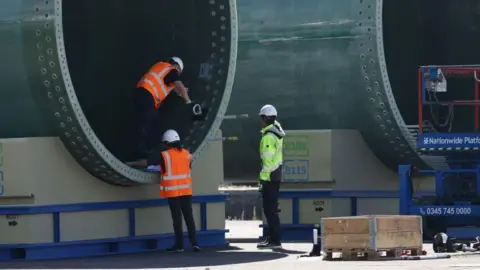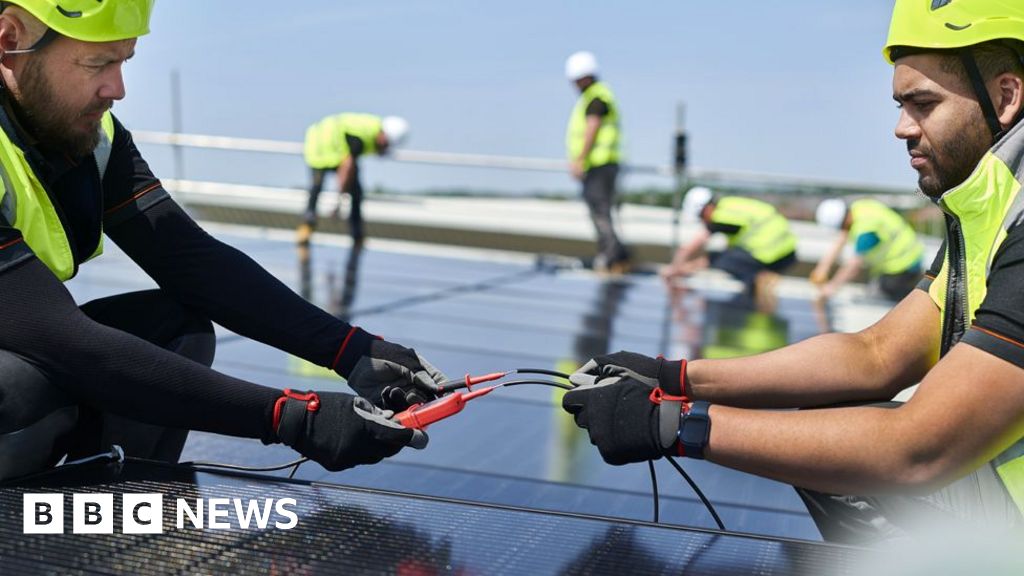Paul Seddon,Jennifer McKiernan
 Getty Images
Getty ImagesLabour’s leader says his party’s green energy plans will ensure the UK’s transition away from oil and gas does not repeat mistakes from the phase-out of coal.
The party has been accused of putting jobs at risk by vowing not to issue any new oil and gas licences if it wins power at July’s general election.
The SNP says the proposals, along with Labour’s plan to hike taxes on firms’ profits, would put thousands of Scottish jobs at risk.
But Sir Keir Starmer argued his party’s plans for a new green investment firm would safeguard replacement jobs for generations to come.
Labour wants to set up a new public company, branded Great British Energy, to be headquartered in Scotland.
The party has made it the focus of its campaigning on Friday, with Sir Keir travelling to Scotland to promote the idea.
However, the party was forced to clarify what Great British Energy would do after the Labour leader told BBC Radio Scotland it would be an “investment vehicle, not an energy company”.
This prompted the Scottish Greens to accuse Labour, which has previously said it would also generate electricity itself, of a “U-turn”.
Labour has since confirmed that, although it will not be an energy retail company, it will generate power in its own right, as well as owning, managing and operating clean power projects alongside private firms.
Conservative Energy Secretary Claire Coutinho seized on the clarification, saying it demonstrated the “latest chaos in the Labour campaign”.
Labour wants to hand the company £8.3bn over the next five years for investments, funded by a windfall tax on the profits of oil and gas companies.
The government already has such a tax, recently extended until 2029, but Labour would charge a higher rate and close some tax allowances for investment.
The party has said initial investments would focus on wind and solar projects, with new technologies such as floating offshore wind, hydrogen and carbon capture and storage also eligible for funding.
It hopes that each pound of public investment would trigger a further £3 in private-sector funding for projects, and help secure domestic production.
At the same time, Labour says it would not issue new licences for oil and gas projects, which are largely based in Scotland.
It has specified that it would honour existing licences, but the plan has prompted warnings from the SNP, as well as unions, that jobs would be put at risk.
The SNP has also attacked Labour’s plans to get existing nuclear plans in England over the line, adding it would be done using “Scotland’s energy wealth”.
‘Huge mistake’
Speaking to BBC Radio Scotland, Sir Keir said Labour was not planning to “turn the pipes off instantaneously”, adding oil and gas would be part of the UK’s “energy mix for decades to come”.
He added that “we have to make the transition” away from fossil fuels, but this could bring new jobs to Scotland that would “last for decades”.
He drew a comparison with coal-fired power, which provided over 40% of the UK’s electricity just over a decade ago, but is due to come to an end later this year.
“I think a huge mistake was made when coal started coming to an end and the government of the day didn’t plan for the future,” he added.
“We have to plan for the future, do the transition properly – and that is the best way to make sure jobs are there, not just for this generation, but for the next and the generation after that”.

Labour’s plan to set up GB Energy has been backed by Sir Patrick Vallance, the government’s former chief scientific advisor who sprang to fame during the Covid pandemic.
Speaking to the BBC, he added the creation of clean power was “not currently happening in the way that I think it needs to”.
However, Conservative Energy Secretary Claire Coutinho has attacked Labour’s plans as unfunded.
The Tories have also challenged Labour’s claim it would reduce bills by up to £300, with the party saying it would have “no immediate impact” on costs.
The proposals have also been criticised by the Green Party, which argues the planned level of investment is not big enough.
Co-leader Adrian Ramsay said the planned £8.3bn investment over five years would be “nowhere near enough” to allow Labour to hit its target to deliver a net zero carbon electricity system by 2030.
He added meeting that target would require greater electrification of home heating – which Labour had “ditched” when it scaled back its separate green energy fund earlier this year.


